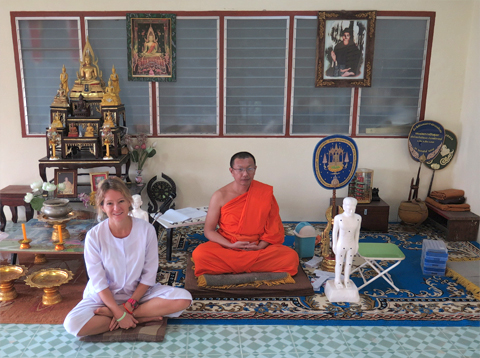

Mindfulness

Mindfulness practise in the West comes from Buddhist practise in the East. However, you don’t need to be a Buddhist to practise mindfulness. Mindfulness is for everyone and is now taught through mindfulness courses as a totally secular method for managing stress and distress, both physical and psychological. The success of mindfulness practise is evident in the popularity of people attending courses as well as experiencing the benefits of the practice.
A simple definition of mindfulness is being fully aware in the present moment, non-judgementally and with full acceptance of what is right now, with the knowledge that this will change.
So what does this mean? We live in a frantic world, many of us are so busy getting to the future that the present hardly exists in our minds. The future is uncertain, so the mind projects itself into an imaginary future, creating anxiety and fear about what may or may not happen. Of course, we cannot do anything about that imaginary future, because it doesn’t exit, and may never become reality. Nonetheless, our minds create fear and anxiety, which in turn affects our physical and psychological well-being.
Others spend a lot of time in the past; talking about it, thinking about it, feeling regret, shame, guilt, pride, resentment and other emotions created by the memories from the past that linger in the present.
Thinking about the future and the past is natural and part of being human. We are constantly developing and evolving according to our experiences, and by projecting ourselves into the future we ensure survival.
However, we can also become overwhelmed with the emotions created by spending much of our time oscillating from the past to the future and back again. By learning to observe the mind we can start to learn about how our moods are affected by where the mind is and what thoughts are present. When we are thinking about the future, and we are hopeful about it, our mood is elevated, and when we are worrying about a potential catastrophe looming ahead of us, we become anxious and fearful.
By cultivating mindfulness practise in our daily lives, we are aiming to become an observer of our thoughts, rather than be ruled by them. We are practicing accepting the thoughts, and then allowing them to pass. We are practicing bringing the mind back to the present when it leaps ahead, or bounces back in time, in order to learn to exist in the present moment, even if it is just for a few moments.
During mindfulness practise, whether it is formal meditation, yoga, or in day to day moments of mindful awareness, we start to recognize some of our cognitive distortions, our maladaptive thinking patterns, our intrusive thoughts, our imaginary catastrophes looming ahead. We learn to accept our thoughts, non-judgementally, but we also learn that they are temporary, they are not necessarily real, they will pass.
There is now more and more research emerging that suggests that mindfulness practise and meditation is an effective method for managing emotional stress and distress. Neuroscience has identified the areas of the brain that change when people start practising mindfulness and meditation.
Mindfulness course
The current courses are 8 week introduction to mindfulness courses incorporating proven methods from meditation, yoga, mindfulness practise and psychology. Psycho-educational material will be delivered alongside experiential and practical skills for learning to manage stress, anxiety, anger, depression and other difficult emotional states.
What you will learn from the therapeutic mindfulness training are life skills that once practised and incorporated into everyday life, you will be able to tap into during particularly stressful or challenging times. For more information go to the courses and classes page, or contact me directly.
Jane worked in a residential rehab in Thailand where Mindfulness is very much part of the culture. She also spent 6 weeks in Chiang Mai in North Thailand in a temple learning Mindfulness from the monks.